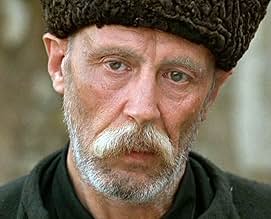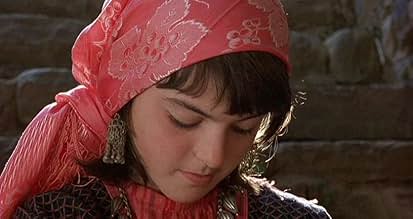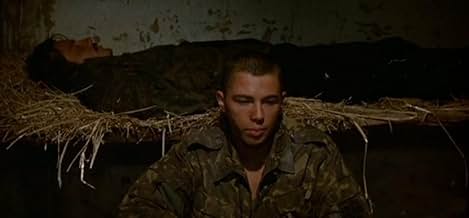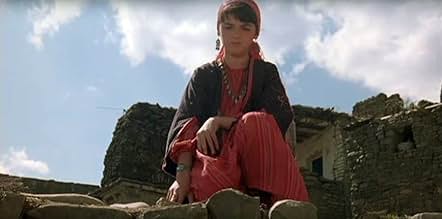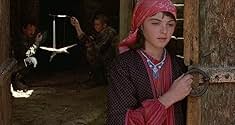AVALIAÇÃO DA IMDb
7,5/10
4,9 mil
SUA AVALIAÇÃO
Adicionar um enredo no seu idiomaTwo Russian soldiers, one battle-seasoned and the other barely into his boots and uniform, are taken prisoner by an anxious Islamic father from a remote village hoping to trade them for his ... Ler tudoTwo Russian soldiers, one battle-seasoned and the other barely into his boots and uniform, are taken prisoner by an anxious Islamic father from a remote village hoping to trade them for his captured son.Two Russian soldiers, one battle-seasoned and the other barely into his boots and uniform, are taken prisoner by an anxious Islamic father from a remote village hoping to trade them for his captured son.
- Direção
- Roteiristas
- Artistas
- Indicado a 1 Oscar
- 14 vitórias e 7 indicações no total
Avaliações em destaque
10mozibuzi
In this film, I can find almost everything what I like in a movie. It presents the life of a small community, their thoughts, their feelings and their habits. It has a nice atmosphere, beautiful sights, good actors, and a strong story. What else do you want? Another reason to love Russian movies.
In the war between Russia and Chechnya, the two Russian soldiers Sacha (Oleg Menshikov) and Vanya (Sergei Bodrov Jr.) are ambushed and made prisoners of war by a group of Chechens. The old man Abdul-Murat (Dzhemal Sikharulidze) wants to exchange them by his last son, who was arrested by the Russian troops. His other two sons were killed by the Russians, and his family is composed only by his teenager daughter Dina (Susanna Mekhraliyeva) and himself. The two soldiers are kept alive in his village, while Abdul tries to negotiate them with the Russian Commander Maslov (Aleksei Zharkov). Sacha and Vanya are very different persons and while together, they get closer. Sacha has the mentality of a soldier, intending to kill the Chechens from the village, while Vanya is a teacher and prefers to try to understand the locals behavior and culture, performing small jobs for them, like fixing clocks. Vanya falls in love with Dina. This beautiful movie is another magnificent anti-war movie. The touching story, supported by an excellent cast and the Caucasian locations, makes this movie a worthwhile entertainment. My vote is nine.
Title (Brazil): `Prisioneiros das Montanhas' (`Prisoners of the Mountains')
Title (Brazil): `Prisioneiros das Montanhas' (`Prisoners of the Mountains')
Prisoner of the Mountains provides an inside look into the Russia/Chechnya conflict through the eyes of two captured Russian soldiers, Vania and Sacha. The unlikely duo forms a friendship out of their will to escape their imprisonment. Despite the serious basis for the story (the continuing war between the two countries), the film is very multifaceted in that it contains comedy, love, and suspense. In this respect, I greatly disagree with another user who described the film as `bleak, tedious, and uneventful.' The main reason this film succeeds is that it does not only focus on the war and battles between the two sides, but rather develops the underside of the conflict-the characters on both sides.
This user likens this film to watching polar bears sleeping because violence only makes up ten per cent of the plot. I have seen movies that are as boring as this analogy. Prisoner of the Mountains does not qualify as this type of film. Bodrov incorporates many different types of scenes in the plot action that evoke a variety of emotions from the audience. There are serious scenes, such as when Sacha and Vania are captured, which elicit fear and apprehension in the viewer. In contrast, there are also more humorous scenes, as in when Vania continues to meddle with the gun he and Sacha stole, after Sacha warns him to be careful, and the gun fires, causing them to lose their only bullet. In this respect, Bodrov makes his film very well-rounded by incorporating various types of scenes that play to different emotions. While the central plot is serious in its portrayal of the war, Bodrov includes less intense scenes in order make the film more interesting and develop the personalities of the characters. The scenes in which Vania and Sacha are shown `getting drunk, whittling, chatting with passers-by, and making friends with their captors' serve to help the audience understand the backgrounds of all of the characters, as well as show character transformation. Through discussions between the two soldiers, the audience discovers that Sacha's at first exterior most likely results from the fact that he is an orphan. In time, we see how Sacha grows to respect Vania, despite his naive nature, and becomes a father-figure to the younger soldier, ultimately sacrificing his life for him. Moreover, we learn how Dina grows fond of Vania and ultimately defies her father to help him escape. In this respect, these scenes are the main point of the movie. In this viewer's desire to see violence, I think he missed the obvious. Bodrov wants the viewer to understand the feelings and motivations of characters on both sides of the conflict. Had the film shown one battle after another, the audience would not have been able to understand the characters because only fighting would have been shown. In this respect, the non-violent scenes are critical to character development as well as the overall impact of the film on the audience.
While violence is the setting for the film, it is not meant to be the sole focus of the plot. Consequently, rating this film based on its lack of violence does not do it justice because violent scenes purposely comprise only a part of the action. This reaction would be similar to evaluating a straight play, which had a few musical numbers, as if it were a musical; you would obviously be let down and give it poor marks because your expectations would be too high. In this way, I do not feel that more violent scenes would have added anything to this film. Bodrov sought to illustrate the general tense atmosphere of the situation through the initial capture of the soldiers, the failed escape of the soldiers, the death of Abdoul's son and the expected shooting of Vania. These incidences of violence effectively convey the difficult environment to the audience. Additional killing would have been gratuitous in light of Bodrov's main emphasis of character development. Overall, I found this film to be incredibly engaging and interesting for its depiction of the bitter conflict between the two countries. As a westerner, I can say that the scenery was nice, but that it was not the only good aspect of the film as this viewer states. Perhaps the name and subject of this film is misleading. To a person who wants to see a lot of violence in films, Prisoner of the Mountains would not be my first recommendation. To this viewer, I would suggest The Betrayed, another film on the Russian/Chechnya conflict with significant violent footage. In forming impressions of films, it is important to take into consideration why the director made the film as he/she did. In this instance, it is clear that Bodrov did not only want to present the violent nature of the war, but that he desired to explore the individuals behind the conflict.
This user likens this film to watching polar bears sleeping because violence only makes up ten per cent of the plot. I have seen movies that are as boring as this analogy. Prisoner of the Mountains does not qualify as this type of film. Bodrov incorporates many different types of scenes in the plot action that evoke a variety of emotions from the audience. There are serious scenes, such as when Sacha and Vania are captured, which elicit fear and apprehension in the viewer. In contrast, there are also more humorous scenes, as in when Vania continues to meddle with the gun he and Sacha stole, after Sacha warns him to be careful, and the gun fires, causing them to lose their only bullet. In this respect, Bodrov makes his film very well-rounded by incorporating various types of scenes that play to different emotions. While the central plot is serious in its portrayal of the war, Bodrov includes less intense scenes in order make the film more interesting and develop the personalities of the characters. The scenes in which Vania and Sacha are shown `getting drunk, whittling, chatting with passers-by, and making friends with their captors' serve to help the audience understand the backgrounds of all of the characters, as well as show character transformation. Through discussions between the two soldiers, the audience discovers that Sacha's at first exterior most likely results from the fact that he is an orphan. In time, we see how Sacha grows to respect Vania, despite his naive nature, and becomes a father-figure to the younger soldier, ultimately sacrificing his life for him. Moreover, we learn how Dina grows fond of Vania and ultimately defies her father to help him escape. In this respect, these scenes are the main point of the movie. In this viewer's desire to see violence, I think he missed the obvious. Bodrov wants the viewer to understand the feelings and motivations of characters on both sides of the conflict. Had the film shown one battle after another, the audience would not have been able to understand the characters because only fighting would have been shown. In this respect, the non-violent scenes are critical to character development as well as the overall impact of the film on the audience.
While violence is the setting for the film, it is not meant to be the sole focus of the plot. Consequently, rating this film based on its lack of violence does not do it justice because violent scenes purposely comprise only a part of the action. This reaction would be similar to evaluating a straight play, which had a few musical numbers, as if it were a musical; you would obviously be let down and give it poor marks because your expectations would be too high. In this way, I do not feel that more violent scenes would have added anything to this film. Bodrov sought to illustrate the general tense atmosphere of the situation through the initial capture of the soldiers, the failed escape of the soldiers, the death of Abdoul's son and the expected shooting of Vania. These incidences of violence effectively convey the difficult environment to the audience. Additional killing would have been gratuitous in light of Bodrov's main emphasis of character development. Overall, I found this film to be incredibly engaging and interesting for its depiction of the bitter conflict between the two countries. As a westerner, I can say that the scenery was nice, but that it was not the only good aspect of the film as this viewer states. Perhaps the name and subject of this film is misleading. To a person who wants to see a lot of violence in films, Prisoner of the Mountains would not be my first recommendation. To this viewer, I would suggest The Betrayed, another film on the Russian/Chechnya conflict with significant violent footage. In forming impressions of films, it is important to take into consideration why the director made the film as he/she did. In this instance, it is clear that Bodrov did not only want to present the violent nature of the war, but that he desired to explore the individuals behind the conflict.
I liked this movie very much. It showed the human side of war. It is a compelling view of life during wartime, as seen through the eyes of a handful of individuals, each with his own perspective and agenda. The story is a warm, sometimes depressing, but ultimately hopeful look at human nature at it's best, and worst.
10ekoronis
The simple story of two men captured an imprisoned in a small village develops actually to one of the most poetic and effective peace messages of our times. Based on stable and very well described characters and by the use of magical photography of a small village in Caucausus the movie helps us face the tragedy of war and the madness of human conflict as well.
The movie is about two Russians captured by the rebels, kept as hostages by an old man whose son is also in prison by the Russians. Since the old man wants to trade the two Russians with his son he insists that they must not be killed, he keeps them as a hope for his own tragical mission, to rescue his own son, despite the fact that other rebels want hostages killed. One of the Russians, actually a young and unexperenced soldier ends up respecting that small village. The relations among villagers and hostages, the deep human touch between the young Russian and the niece of the old man become the real story in the middle of the war.
The viewer confronts since the very beginning what war is about, the importance of human existence and life and the madness of human conflicts. Above all is life, creativity (the youg Russian repairs clocks), laugh and drink. While poverty and sadness reigns in the village tradition and human figures seem to survive. Those human values survive for a few moments before reality shows the cruel side of life once again. The movie is extremely poetic, images and folkloric scenes are well dressed with silent and simple russian music, silence and well developed scenes (the old man loading his son's dead body, the mother of the Russian and the old man meet each other as ennemies with the same feelings though as parenthood is above all wars, the young Russian is afraid to die).
Although the actors are not famous you will appreciate the natural talent of the actor playing the old man, a perfect tall-thin shape which dominates the screen. This movie is a must, a call of nature of humanism, a message which can't lose its modernity.
The movie is about two Russians captured by the rebels, kept as hostages by an old man whose son is also in prison by the Russians. Since the old man wants to trade the two Russians with his son he insists that they must not be killed, he keeps them as a hope for his own tragical mission, to rescue his own son, despite the fact that other rebels want hostages killed. One of the Russians, actually a young and unexperenced soldier ends up respecting that small village. The relations among villagers and hostages, the deep human touch between the young Russian and the niece of the old man become the real story in the middle of the war.
The viewer confronts since the very beginning what war is about, the importance of human existence and life and the madness of human conflicts. Above all is life, creativity (the youg Russian repairs clocks), laugh and drink. While poverty and sadness reigns in the village tradition and human figures seem to survive. Those human values survive for a few moments before reality shows the cruel side of life once again. The movie is extremely poetic, images and folkloric scenes are well dressed with silent and simple russian music, silence and well developed scenes (the old man loading his son's dead body, the mother of the Russian and the old man meet each other as ennemies with the same feelings though as parenthood is above all wars, the young Russian is afraid to die).
Although the actors are not famous you will appreciate the natural talent of the actor playing the old man, a perfect tall-thin shape which dominates the screen. This movie is a must, a call of nature of humanism, a message which can't lose its modernity.
Você sabia?
- CuriosidadesThe film was shot within 20 miles of actual battles then occurring between Russians and Chechens. Local Muslim guerrillas served as bogyguards for the cast and crew. The film tells the story of two prisoners of war, but truth is stranger than fiction: when the guerrillas found out that amateur actress Susanna Mekhraliyeva was paid for her job in U.S. dollars they took the whole film crew prisoner! Her salary was soon changed for Russian rubles and the shooting continued as if nothing had happened.
- Erros de gravaçãoAfter Sacha and Vanya escape and remove the shackles from their ankles, they begin running upstream. The scene cuts to a different angle, and they are running downstream.
- Citações
Sacha Kostylin: I am dead, but I like it. Everything is peaceful now.
- ConexõesFeatured in 54th Golden Globe Awards (1997)
Principais escolhas
Faça login para avaliar e ver a lista de recomendações personalizadas
- How long is Prisoner of the Mountains?Fornecido pela Alexa
Detalhes
Bilheteria
- Faturamento bruto nos EUA e Canadá
- US$ 790.078
- Fim de semana de estreia nos EUA e Canadá
- US$ 17.205
- 2 de fev. de 1997
- Faturamento bruto mundial
- US$ 921.886
Contribua para esta página
Sugerir uma alteração ou adicionar conteúdo ausente

Principal brecha
By what name was Prisioneiro das Montanhas (1996) officially released in India in English?
Responda


